
In this edition:
The AMSAT News Service bulletins are a free, weekly news and information service of AMSAT, The Radio Amateur Satellite Corporation. ANS publishes news related to Amateur Radio in Space including reports on the activities of a worldwide group of Amateur Radio operators who share an active interest in designing, building, launching and communicating through analog and digital Amateur Radio satellites.
The news feed on https://www.amsat.org publishes news of Amateur Radio in Space as soon as our volunteers can post it.
Please send any amateur satellite news or reports to: ans-editor [at] amsat.org
You can sign up for free e-mail delivery of the AMSAT News Service Bulletins via the ANS List; to join this list see: https://mailman.amsat.org/postorius/lists/ans.amsat.org/

AO-109's orbit decayed on or about April 21, 2024 after just over three years in space.
Launched on January 17, 2021, as part of the ELaNa 20 mission using a LauncherOne rocket operated by Virgin Orbit, AO-109, known prior to launch as RadFxSat-2 / Fox-1E, was carried aloft by a modified Boeing 747 named "Cosmic Girl" from the Mojave Air and Space Port in California, United States. After reaching an altitude of approximately 35,000 feet (11,000 meters), the rocket was released into space. This launch, conducted under NASA's CubeSat Launch Initiative program, marked the beginning of the satellite's mission to facilitate amateur radio communications and technology research. A video of the launch can be seen on YouTube.
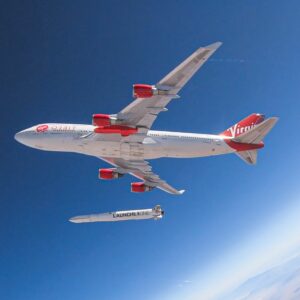
AO-109 represented the fifth iteration of the "Fox" 1U amateur radio satellites series developed by AMSAT, featuring a 30KHz linear transponder radio.
After launch, AMSAT's Engineering and Operations teams listened for the expected beacon signal, but nothing was initially heard. On January 27, 2021, Brad Schumacher, W5SAT, was able to hear his weak CW signals relayed through the satellite's transponder. This was confirmed by AMSAT Engineering and Operations the next day and the satellite was designated AMSAT-OSCAR 109. Continued monitoring confirmed that the satellite was operating properly, but with an extremely low signal output. It is likely that the satellite's final power amplifier transistor failed, limiting power output to just 8 mW.
Although the signal was extremely weak, the satellite was able to support QSOs by CW, FT4/8, and even SSB. Five amateur stations successfully copied the weak telemetry signal from the satellite and provided valuable data about the health of the satellite: the PI9CAM radio telescope in Dwingeloo, Netherlands, provided the bulk of the data from the satellite. WA7FWF, W7KKE, K8DP, and the AMSAT Operations team also copied telemetry.
Upon being declared operational and open for amateur use, despite the limitation of its low power output, on July 20, 2021, AO-109 embarked on a mission to serve both amateur radio and technology research objectives.
The final telemetry data was received on April 5, 2024 from PI9CAM and revealed that the satellite had achieved a remarkable milestone: AO-109 had set a new Fox-1 program record for processor uptime. This information was gathered by Alan Biddle, WA4SCA, who has meticulously monitored telemetry reports on a daily basis and calculated the duration of each reset, allowing for precise correlation of telemetry frames with UTC time.
The Fox satellites are designed to undergo onboard computer resets triggered by factors like radiation exposure and low battery voltage. Time on these satellites is measured by counting resets plus the duration since the last reset. It is common for the Fox satellites to reset every few days or weeks, especially when passing over the South Atlantic Anomaly. However, the processor on AO-109 ran continuously from September 2023 until at least April 5, 2024, accumulating over 18 million seconds of uptime—far surpassing any other Fox satellite.
Among its key payloads was the RadFx-2 experiment, a collaboration with Vanderbilt University, aimed at studying the effects of space radiation on specific SRAM types. Consistent with the Fox-1A design blueprint, AO-109 was equipped with a 2-meter whip antenna and a 70 cm whip antenna.
The linear transponder module developed for AO-109 also evolved into a program to equip other CubeSats with linear transponders. Evolutions of this transponder previously flew aboard HO-107 (HuskySat-1) and the next one is scheduled to fly aboard MESAT-1 later this year. AMSAT's GOLF program will also carry this linear transponder module for VHF/UHF communications.
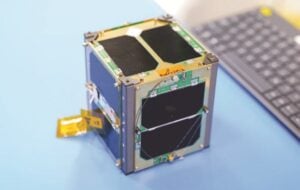
[ANS thanks AMSAT Operations and Engineering for the above information]
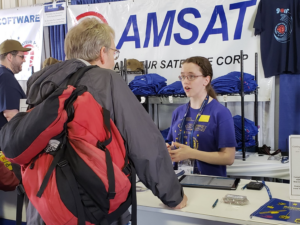
Hamvention is just weeks away at the Greene County Fairgrounds in Xenia, OH May 17-19, 2024! AMSAT will have our usual robust presence and after-hours activities.
Volunteer at the AMSAT Booth - (Building 1, 1007-1010 & 1107-1110)
AMSAT is actively seeking volunteers to assist with booth activities and invites enthusiasts to dedicate their time. Last year, around 20 volunteers played crucial roles in fostering meaningful interactions with attendees. Volunteers, whether able to commit a few hours or the entire weekend, are warmly encouraged to participate.
Aligned with this year's theme of "Expanding our Community," AMSAT aims to strengthen its presence by recruiting new members and volunteers. For those eager to be part of AMSAT's presence at Dayton Hamvention or request more information about volunteering, Phil Smith, W1EME, AMSAT Hamvention Team Leader, serves as the point of contact. To volunteer or inquire further, individuals can reach out to Phil via email at w1eme [at] amsat.org. Your involvement not only enriches the event but also contributes to the vibrant amateur radio community.
AMSAT Forum - Saturday, May 18th
The AMSAT Forum will take place in Forum Room 2 at 1:20pm - 2:50pm on Saturday, May 18th. This will immediately follow the ARISS Forum in the same room at 12:10pm, so get there early and see both presentations!
AMSAT Dinner at Tickets - Thursday, May 16th
The annual AMSAT “Dinner at Tickets” party will be held at Tickets Pub & Eatery on Thursday, May 16th from 6:00 PM to 8:00 PM EDT. There is no program or speaker – just good conversation. Everyone is invited regardless of whether or not they helped with setup or plan to work in the booth. Tickets has a great selection of Greek and American food and great company! Food can be ordered from the menu; drinks (beer, wine, sodas and iced tea) are available at the bar.
Come as you are; no reservations required. Bring some friends and have a great time the night before Hamvention. Tickets Pub & Eatery is located at 7 W. Main St, Fairborn, OH 45324. (Telephone (937) 878-9022)
AMSAT/TAPR Banquet - Friday, May 17th
The 15th annual AMSAT/TAPR Banquet will be held at the Kohler Presidential Banquet Center on Friday, May 17th at 18:30 EDT. This dinner is always a highlight of the TAPR (Tucson Amateur Packet Radio) and AMSAT (Radio Amateur Satellite Corp.) activities during the Dayton Hamvention. This year’s banquet speaker will be Bill Reed, NX5R, AMSAT PACSAT Project Manager, who will highlight the forthcoming PACSAT digital communications payload.
The Kohler Presidential Banquet Center is located at 4548 Presidential Way, Kettering, Ohio – about 20 minutes away from the Greene County Fairgrounds.
Tickets ($60 each) may be purchased from the AMSAT store. The banquet ticket purchase deadline is Friday, May 10th. Banquet tickets must be purchased in advance and will not be sold at the AMSAT booth. There will be no tickets to pick up at the AMSAT booth. Tickets purchased on-line will be maintained on a list with check-in at the door at the banquet center. Seating is limited to the number of meals reserved with the Kohler caterers based on the number of tickets sold by the deadline.
[ANS thanks the AMSAT Hamvention Team for the above information]
Robusta-3A is a 3U CubeSat with multiple mission
1) Amateur: Store & forward repeater, refer to 5.5 paragraph for more details.
2) Educational: No less than 300 students participated in the development of the platform. As part of their training, a module is allocated to the initiation to amateur radio. In addition, we pass the license to around ten students each year with the ANFR (French administration) and 3 new operators at CSUM.
3) Technical validation mission: An S-band transmitter is on board operating in commercial band for test purposes. This payload will not be controlled by the amateur radio band.
The HAM radio messaging system provides a message-exchanging service between amateur radio users using Robusta satellite missions as relays. The main purpose of the system is to enable HAM radio operators to send and receive messages from anywhere in the world without having a direct (end-to-end) connection between them. The messaging system uses a method called ‘store and forward’ to provide this service. Messages are transported to the relay station (satellite) by a radio link, and from one geographical location to another, by the satellite orbital movement. A user sends a message to the satellite during a pass and the message is stored in the satellite’s memory. The satellite then moves on its orbit, making the stored message available for other HAM radio operators. Users can request messages to the satellite which, in turn will check if there are any stored messages available for that particular operator. Finally, the message is transmitted and it arrives at its destination
A UHF downlink using 9k6 GMSK with AX25 is proposed. Launch is planned on the Ariane 6 maiden flight from Kourou, French Guiana into a 580 km circular 96 degree orbit together with GRBBEta and ISTSAT. More info at https://csum.umontpellier.fr/en/nanosatellites-projects-our-3u-projects/
[ANS thanks the IARU for the above information]
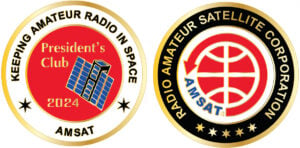
Two Line Elements or TLEs, often referred to as Keplerian elements or keps in the amateur community, are the inputs to the SGP4 standard mathematical model of spacecraft orbits used by most amateur tracking programs. Weekly updates are completely adequate for most amateur satellites. TLE bulletin files are updated Thursday evenings around 2300 UTC, or more frequently if new high interest satellites are launched. More information may be found at https://www.amsat.org/keplerian-elements-resources/
The following satellite has been added to this week's AMSAT-NA TLE distribution:
KASHIWA NORAD Cat ID 59508 Downlink 437.3794 MHz
The following satellite has been removed from this week's AMSAT-NA TLE distribution:
AO-109 NORAD Cat ID 47311 Decayed from orbit on or about 21 April 2024
[ANS thanks Joe Fitzgerald, KM1P, AMSAT Orbital Elements Manager, for the above information]
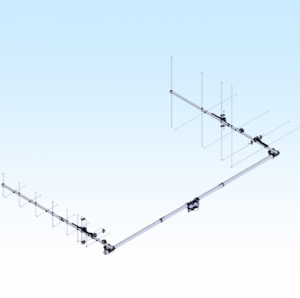
Amateurs and others around the world may listen in on contacts between amateurs operating in schools and allowing students to interact with astronauts and cosmonauts aboard the International Space Station. The downlink frequency on which to listen is 145.800 MHz worldwide.
Centennial Campus Magnet Middle School Center for Innovation, Raleigh, NC, telebridge via K6DUE
The ISS callsign is presently scheduled to be NA1SS
The scheduled crewmember is Matthew Dominick KCØTOR
The ARISS mentor is AA6TB
Contact is go for: Wed 2024-05-01 12:03:49 UTC 76 deg
Watch for Livestream at: https://youtube.com/live/4ZU7I208cw4
Wireless Institute of Australia / Bundaberg High School Amateur Radio Club, Bundaberg, Queensland, Australia, telebridge via VK6MJ
The ISS callsign is presently scheduled to be NA1SS
The scheduled crewmember is Mike Barratt KD5MIJ
The ARISS mentor is VK4KHZ
Contact is go for: Sat 2024-05-04 10:28:24 UTC 51 deg
As always, if there is an EVA, a docking, or an undocking; the ARISS radios are turned off as part of the safety protocol.
The crossband repeater continues to be active (145.990 MHz up {PL 67} & 437.800 MHz down), If any crewmember is so inclined, all they have to do is pick up the microphone, raise the volume up, and talk on the crossband repeater. So give a listen, you just never know.
Note, all times are approximate. It is recommended that you do your own orbital prediction or start listening about 10 minutes before the listed time.
The latest information on the operation mode can be found at https://www.ariss.org/current-status-of-iss-stations.html
The latest list of frequencies in use can be found at https://www.ariss.org/contact-the-iss.html
[ANS thanks Charlie Sufana, AJ9N, one of the ARISS operation team mentors for the above information]
None
[ANS thanks Ian Parsons, K5ZM, AMSAT Rover Page Manager, and Alex Ners, K6VHF, for the above information]
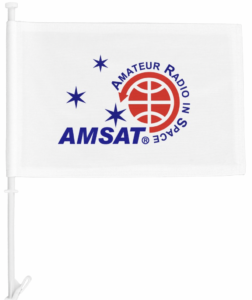
AMSAT Ambassadors provide presentations, demonstrate communicating through amateur satellites, and host information tables at club meetings, hamfests, conventions, maker faires, and other events.
AMSAT Ambassador Clint Bradford, K6LCS, says,
"Two “different” audiences last week invited me to speak. The Mount Baker Amateur Radio Club in Bellingham, WA, was a ham club - and we had a great time."
"Think a 75-minute presentation on "working the easy satellites" would be appropriate for your club or event? Let me know by emailing me at k6lcsclint (at) gmail (dot) com or calling me at 909-999-SATS (7287)!"
Clint has NEVER given the exact same show twice: EACH of the 150+ presentations so far has been customized/tailored to their audiences.
Dayton Hamvention 2024
Friday May 17th through Sunday May 19th, 2024
Greene County Fairgrounds and Expo Center
120 Fairground Road
Xenia, OH 45385
https://hamvention.org
[ANS thanks Clint Bradford, K6LCS, and AMSAT for the above information]
+ David Bowman, G0MRF, and Graham Shirville, G3VZV, will travel to St. Johns, Newfoundland May 15-19, 2024 in an attempt to operate QO-100 from below the horizon and claim trophies sponsored by AMSAT-UK and the British Amateur Television Club for the first QO-100 QSOs from North America. AMSAT-UK and BATC posed the challenge in 2022. The trophies have so far gone unclaimed, though successful below horizon operation on QO-100 has occurred from Indonesia. (ANS thanks David Bowman, G0MRF, for the above information)
+ Members of the AMSAT Engineering team attended the CubeSat Developer's Workshop in San Luis Obispo, CA this past week. The workshop offered an opportunity for AMSAT Engineers to network with other CubeSat developers and learn about the most recent developments in space technology as applied to CubeSats.
+ The U.S. space agency says its Voyager-1 probe is once again sending usable information back to Earth after months of spouting gibberish. The 46-year-old NASA spacecraft is humanity's most distant object. A computer fault stopped it returning readable data in November but engineers have now fixed this. For the moment, Voyager is sending back only health data about its onboard systems, but further work should get the scientific instruments back online. Voyager-1 is more than 24 billion km (15 billion miles) away, so distant, its radio messages take a full 22.5 hours to reach us. (ANS thanks BBC News for the above information.)
+ In Colorado Springs, Colorado, students at the Thrive Home School Academy (THSA), along with students at Stratton Meadows Elementary (SME), were able to have a space chat with NASA astronaut and mission specialist Jeanette "Jo" Epps, KF5QNU, on board the International Space Station (ISS) on April 22, 2024. At the time of the contact Epps, a member of the SpaceX Crew-8 mission, was on her 47th day of the 180-day mission. (ANS thanks the ARRL Letter for the above information.)
Join AMSAT today at https://launch.amsat.org/
In addition to regular membership, AMSAT offers membership to:
Contact info [at] amsat.org for additional membership information.
73 and remember to help Keep Amateur Radio in Space!
This week's ANS Editor,
Paul Stoetzer, N8HM
n8hm [at] amsat.org
ANS is a service of AMSAT, the Radio Amateur Satellite Corporation, 712 H Street NE, Suite 1653, Washington, DC 20002